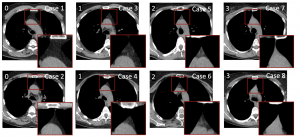As we age, changes in our bodies occur, some of which are more visible than others. A remarkable organ, the thymus, which plays a crucial role in our immune system, transforms with age, a process often characterized by the replacement of glandular tissue with fat. However, a recent study has uncovered that the rate of this transformation is connected to sex, age, and lifestyle, offering insights into the aging of the immune system itself.
In this study, scientists looked into thymus transformations using chest CT scans from over 1,000 individuals in the age range of 50 to 64 (Figure 1). The study went beyond imaging, encompassing an array of health assessments and data on lifestyle factors, including dietary habits and physical activity. Moreover, blood samples were analyzed to gain deeper insights into immune cells.
The outcomes revealed an extensive variation in thymus appearance. Remarkably, six out of ten participants exhibited complete fatty degeneration of the thymus. This phenomenon was more prevalent in men than in women, with a notable correlation to abdominal obesity. Lifestyle factors emerged as key players as well. Notably, individuals with low dietary fiber intake were more prone to thymic fatty degeneration. This research significantly advances our knowledge by linking thymus appearance to lifestyle and health factors and its impact on the immune system.
One revelation in this study was the link between thymic fatty degeneration and lower T-cell regeneration. This connection implies that the visual changes observed in CT scans not only serve as an image but also mirror the thymus’s functional aspects. While further research is required to fully comprehend the implications of thymus appearance on immune defense aging, this study is a promising step toward a deeper understanding of the interplay between our immune system and aging.
In the years to come, the insights gained from studying the thymus may hold the potential to revolutionize our approach to immune system health and aging.
Journal article: Sandstedt, M., 2023. Complete fatty degeneration of thymus associates with male sex, obesity and loss of circulating naïve CD8+ T cells in a Swedish middle-aged population. Immunity & Ageing.
Summary by Stefan Botha











